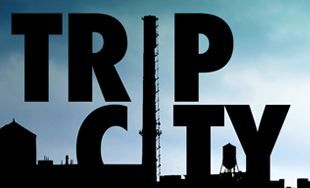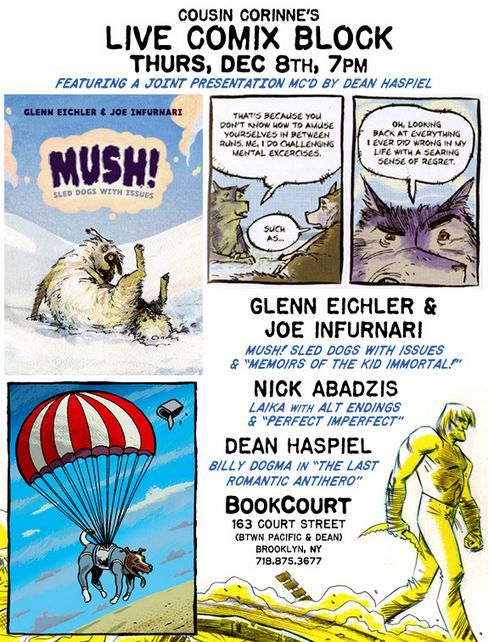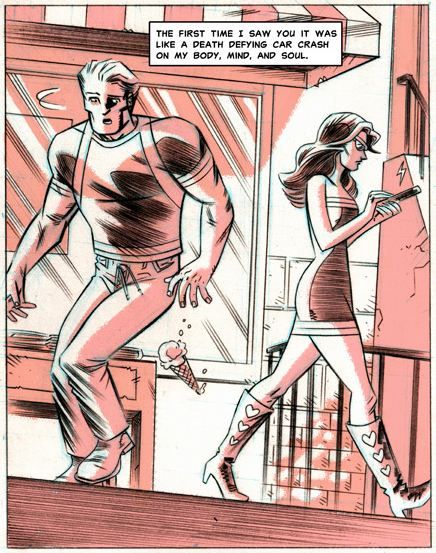As long as I have been covering the comics industry, it seems like I have always found reasons to support the work of Dean Haspiel and/or his many talented associates. So when Trip City, a Brooklyn-filtered literary arts salon, launched at the start of last month it struck me as a good time to reach out to the founders for an email chat. While Trip City has four key members (Haspiel, Seth Kushner, Chris Miskiewicz and Jeffrey Burandt) the bulk of the discussion involved Kushner and Miskiewicz, with a brief check-in by Haspiel (discussing the start of a new Billy Dogma story, The Last Romantic Antihero [TLRA]). Haspiel also gave me a head's up on a December 8 TLRA live reading at BookCourt at 7 PM (163 Court St Brooklyn, New York 11201/718-875-3677).
Tim O'Shea: When did TRIP CITY first get conceived--and how did the two of you come to be involved? How early in the planning was it determined that a podcast would be important to the venture?
Chris Miskiewicz: Dean was leaving Deep6 and starting a new studio. Seth Kushner and I were the first people he asked along. Although my film schedule is always in flux and I wasn’t sure how often I’d actually be there, the idea of sitting around others and not being by myself writing appealed to me. So we formed HANG DAI Studios.
If you put three creative people in a room together stuff happens. What happened was TRIP CITY. We spoke about the concept for about five months. Who would be a part of it, what we’d do, how we’d do it. We didn’t want to revamp ACT-I-VATE but we did want comics, along with prose, fiction, a web-series, and a podcast. What we did was create a multimedia site that catered to our individual interests blending them together into a whole.
Seth Kushner: I’d been posting my content in various places. On GRAPHIC NYC (NYCGraphicNovelists.com) I was posting my photographic portraits of comics creators, along with Chris Irving’s interview-based essays. I also wrote personal and pop-culture essays there. I was posting my photos and behind-the-scenes material from my shoots on my personal blog, SethKushner.blogspot.com. And, my series, CulturePOP Photocomix was appearing on ActivateComix.com. I wondered if I was spreading myself too thin over too many venues. TRIP CITY was created and designed to be the venue for a group of us who all felt we needed ONE place to post our unique content and sell our wares.
O'Shea: You really were ambitious with the bookings for the first two podcasts (Michael Moore and Henry Rollins). How hard was it to arrange for these two, and will the goal always be to go for "big name" mainstream interview subjects?
Kushner: One of my favorite quotes is by Woody Allen—“80% of success is showing up.” I couldn’t agree more, but I would add that in addition to showing up, also be polite and persistent, know some of the right people, and hopefully have at least a little bit of cred.
We’re very fortunate to have our studio, HANG DAI located above BookCourt, Brooklyn’s premiere independent bookstore. They get big names to do appearances at the store, so we’ve teamed up with them to “share” some of their visiting guests.
With the BookCourt’s help, we basically took shots in the dark at Moore’s and Rollins’s publicists before the site had even launched. I wrote polite query emails, in which I described the site, dropped some names of publications where my work has appeared (NY Times Magazine, Time, L’Uomo Vogue, my book, The Brooklynites) and mentioned that Emmy winner Dean Haspiel and Eisner winner Nick Abadzis were involved in the site. To our delight, both agreed to the interview and photoshoot. Now, we have a nice looking site and Michael Moore and Henry Rollins to use as leverage for future guests.
One of the interesting aspects of the podcast is how we take a sort of “artist-to-artist” approach to the interviews. While Chris “hosts” and produces the podcast, we try to match-up each guest with an appropriate interviewer. For example, our buddy Dan Goldman, who’s done such politically charged graphic novels as Shooting War and 08 was matched up with Michael Moore. Fellow TC contributor Amy Finkel, a filmmaker and punk music aficionado, was the right interviewer for Henry Rollins. We’ve got Dean and artist Jen Ferguson interviewing cartoonist Ben Katchor on the current episode. Upcoming, artist Krista Dragomer talks to artist/actress/filmmaker/author Miranda July for the next one, and writer/musician Jeffrey Burandt interviewing author Jonathan Lethem on the one after.
So, the bar is set high, but we plan to continue to roll out “name” guests, and more importantly, guests whose work we admire and who inspire us.
O'Shea: Do you hope to have some recurring segments on the podcast as the project evolves?
Miskiewicz: We’re looking at it as showcasing our featured guest with a TC-Podcast show running before it that talks about what’s going on with our contributors which includes some comedy skits like “Ronnie’s Story” “How to in 2” and a variety of real and made up news stories coming down the line. We also close with a featured song.
O'Shea: How do the two of you divvy up the production responsibilities for the podcast?
Miskiewicz: Seth & Dean have been getting our guests. A conversation goes out about who in our group will conduct the interview. We have a group meeting about the overall schedule. And then I build the podcast, picking the order, which skits, and which jokes.
O'Shea: Are there certain podcasts that the two of you listen to on a regular basis and that achieve the kind of vibe/content you hope to offer for TRIP CITY (to give interested listeners context)?
Kushner: I listen regularly to Marc Maron’s WTF podcast and also to John Siuntres’ Word Balloon. What they have in common, is they feature smart, honest, in-depth discussions about process with folks I find fascinating--Marc with comedians, and John with comic book creators. Dean and I are both fans of that type of format and Chris really enjoys silly, ironic humor, so he creates segments to go in-between the smart stuff.
O'Shea:Seth, how gratifying is it to have a forum where you "have a venue to post the type of material I most wanted to work on, no matter how esoteric or personal". How hard was it to write about your late father?
Kushner: The piece, Patrick Stewart And My Father was the first of a series of “personal/pop-culture” essays I’ve written. I followed it with How Mark Hamill Changed My Life and I Hated Star Trek. The concept is to show how popular culture, the things we all love, informs our life and how some of the periods of our lives can be tied into these things.
It wasn’t that difficult to write about my late father. It’s been a lot of years, and I see the piece as a tribute to him, and to some extent, to Partick Stewart.
O'Shea: Chris, in addition to your role in the podcast, what kind of content to you intend to develop for TRIP CITY?
Miskiewicz: In December I’ll be posting a 24-page children’s story entitled Astor Place as well as the second part of Adrift with Kate McElroy.
I’ll be publishing the first chapter of my novel Allergy Season in parts to run as a weekly until it’s completion, as well as several short stories.
However the bulk of my presence within Trip City comes into play when we launch our webseries station, Trip City Television in late February/March.
I’m currently in production on two original web-shows for the station. But we’ll also have short films and skits from outside contributors. It’s going to be a lot of fun.
O'Shea: What else is on the TRIP CITY horizon?
Kushner: There’s lots brewing at TRIP CITY. I’ve been continuing my series CulturePOP Photocomix on TRIP CITY. Author and creator of HBO’s Bored To Death Jonathan Ames was the first one, followed by comedian and WTF podcaster Marc Maron. Upcoming I have Moby and James Haspiel, Dean’s dad and friend and biographer of Marilyn Monroe.
I will also be writing my own semi-autobio comix series called, SCHMUCK. The first chapter, illustrated by Kevin Colden, appeared on ActivateComix.com two years ago. Moving forward, I’ll have different artists illustrating 8-10 page chapters. I plan to launch it in February and then post monthly.
The big thing coming on the site proper is Dean’s new Billy Dogma story, The Last Romantic Antihero. I’ve seen it and it’s a doozy and it will appear only on TRIP CITY. Look for it on 12/6.
Dean Haspiel: The Last Romantic Antihero is my gauntlet to woo virgin readers to the BILLY DOGMA mythology while welcoming fans to TRIP CITY, where I get to hit the re-set button both creatively and narratively. I'm excited to grow a multimedia home that challenges me to experiment new story ideas among a diverse set of accomplished and highly individualistic creators.



